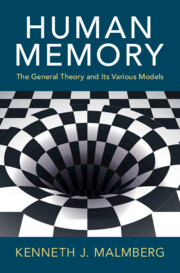Book contents
- Human Memory
- Human Memory
- Copyright page
- Contents
- Figures
- Foreword
- Preface
- Acknowledgments
- Chapter 1 Introduction
- Chapter 2 Models of Cognitive Control, Storage, and Retrieval
- Chapter 3 Search and Detection
- Chapter 4 Sequential Effects
- Chapter 5 Forgetting
- Chapter 6 Differentiation
- Chapter 7 Knowledge
- Chapter 8 Modeling the Consequences of Testing Memory
- Chapter 9 The Buffer Model Revisited
- References
- Index
Chapter 7 - Knowledge
Published online by Cambridge University Press: 17 January 2025
- Human Memory
- Human Memory
- Copyright page
- Contents
- Figures
- Foreword
- Preface
- Acknowledgments
- Chapter 1 Introduction
- Chapter 2 Models of Cognitive Control, Storage, and Retrieval
- Chapter 3 Search and Detection
- Chapter 4 Sequential Effects
- Chapter 5 Forgetting
- Chapter 6 Differentiation
- Chapter 7 Knowledge
- Chapter 8 Modeling the Consequences of Testing Memory
- Chapter 9 The Buffer Model Revisited
- References
- Index
Summary
With development of the retrieving effectively from memory (REM) modeling framework, research on the interaction of experience and knowledge has taken off. While in its infancy, several models of lexical access have been developed. These models have more recently been extended to describe how experience leads to knowledge. Both the strengths and limitations of the current models are described.
- Type
- Chapter
- Information
- Human MemoryThe General Theory and Its Various Models, pp. 168 - 194Publisher: Cambridge University PressPrint publication year: 2024

